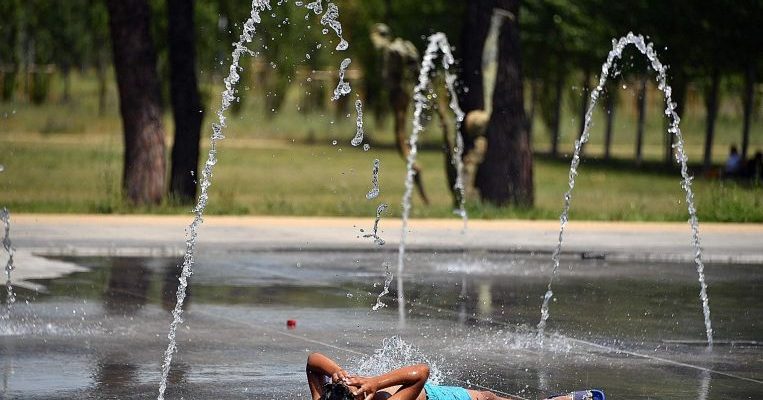
PARIS/MADRID • Hundreds of firefighters yesterday battled to contain wildfires in southern France as a stifling heatwave brought record-breaking temperatures to parts of Europe, killing at least three people in Italy.
In the Gard region, where France’s highest temperature on record was registered on Friday at 45.9 deg C, scores of fires burned some 600ha of land and destroyed several houses and vehicles, emergency services said.
More than 700 firefighters and 10 aircraft were mobilised to tackle the fires in Gard, some of which caused sections of motorways to be temporarily closed. Several firefighters were hurt but no serious injuries were reported.
French media said a man had been arrested for deliberately starting fires in one Gard village. The extreme heat was expected to ease yesterday in southern France but highs were still forecast at close to 40 deg C.
Farther north, Paris was due to experience its hottest day of the heatwave so far, with a predicted high of 37 deg C. The authorities maintained a ban on driving older cars to curb heatwave-related pollution.
The World Meteorological Organisation said last week that 2019 is on track to be among the world’s hottest years, and 2015-2019 would be the hottest five-year period on record. It said the European heatwave is “absolutely consistent” with extremes linked to the impact of greenhouse gas emissions.
-
Turning up the heat
-
The heatwave across northern Europe occurs when hot air is drawn up from northern Africa, Portugal and Spain during this time of the year, reported the BBC.
This raises temperatures and humidity.
So far this year, northern Europe’s heatwave has been caused by exceptionally hot air that originates from the Sahara desert region in north Africa, the BBC said in a report on Friday.
While heatwaves are not uncommon, their effects are being amplified by the rise in global temperatures due to warming climate, said experts.
Climate specialist Grahame Madge at Britain’s Meteorological Office told the British broadcaster that the world today is around 1 deg C warmer compared with during pre-industrial levels.
“Now when we get a heatwave, it is likely to be a degree or so more,” he said. “They are still extreme events, but they are also becoming more frequent.”
France on Friday hit a new record temperature of 45.9 deg C in Gallargues-le-Montueux, a village in the southern department of Gard, near Montpellier.
Still, the record temperature in France is 2.1 deg C behind Europe’s record of 48 deg C set in Athens in 1977, and 8.1 deg C below the highest temperature measured in the world – 54 deg C recorded in Kuwait in 2016.
Heatwaves are dangerous as they cause dehydration, heat exhaustion and heatstroke.
In August 2003, a devastating heatwave in France killed nearly 15,000 people, many of them elderly people at home.
After the 2003 heatwave, about 70,000 additional deaths were recorded in Europe compared with in previous years, according to a scientific and medical study quoted by the BBC.
A person whose body temperature rises to above 40 deg C should get urgent medical help before heat-stroke sets in, which could cause the person to have breathing difficulties and lose consciousness.
To avoid the worst effects of the heatwave, people should wear loose clothing with light colours, consume plenty of water and carry a towel soaked in water to daub the face.
Britain saw its hottest day of the year so far yesterday, with temperatures reaching up to 34 deg C, said the BBC.
In the Gard region, where France’s highest temperature on record was registered on Friday at 45.9 deg C, scores of fires burned some 600ha of land and destroyed several houses and vehicles, emergency services said.
For a fourth consecutive day in Spain, unusually high temperatures above 43 deg C were forecast yesterday across the country.
Forty of Spain’s 50 regions have been placed under weather alert, with seven of them considered to be at extreme risk, the national meteorological agency said.
In the north-eastern city of Girona, the mercury reached a record high of 43.9 deg C on Friday, the Catalan city’s highest-ever temperature on record.
Firefighters managed to contain 90 per cent of the wildfires that raged across 60 sq km of land in the north-eastern Tarragona province, the Catalan government said yesterday.
Two other wildfires in the central Toledo region were still burning, officials said.
In Italy, the heat killed at least three people as temperatures soared in the central and northern regions, while hospitals in the financial capital Milan saw a 35 per cent rise in the number of emergency visits due to heat-related conditions, local media reported.
Demand for power in the city surged as people cranked up air-conditioning, causing sporadic blackouts in stores and restaurants. Temperatures are forecast to ease in the coming days but will stay high.
Heat-related deaths, mainly among the elderly, were reported in Italy, France and Germany.
“I want to appeal to the sense of responsibility of citizens – there are avoidable deaths in every heatwave,” said French Prime Minister Edouard Philippe.
Scientists warn that global warming linked to human fossil fuel use could make such scorchers more frequent.
French Health Minister Agnes Buzyn warned people tempted to plunge into cold water to do so only in designated public bathing areas, adding that four people have drowned since the beginning of the week.
REUTERS, AGENCE FRANCE-PRESSE
